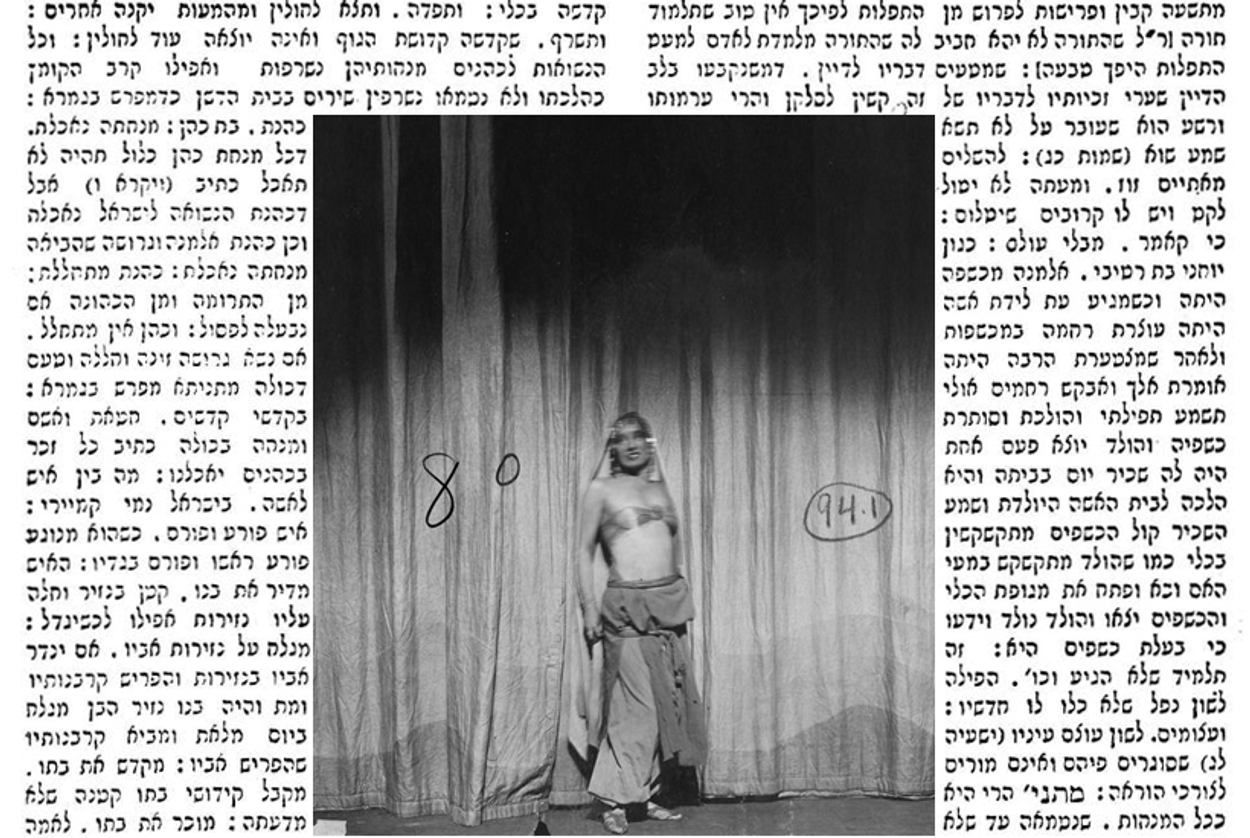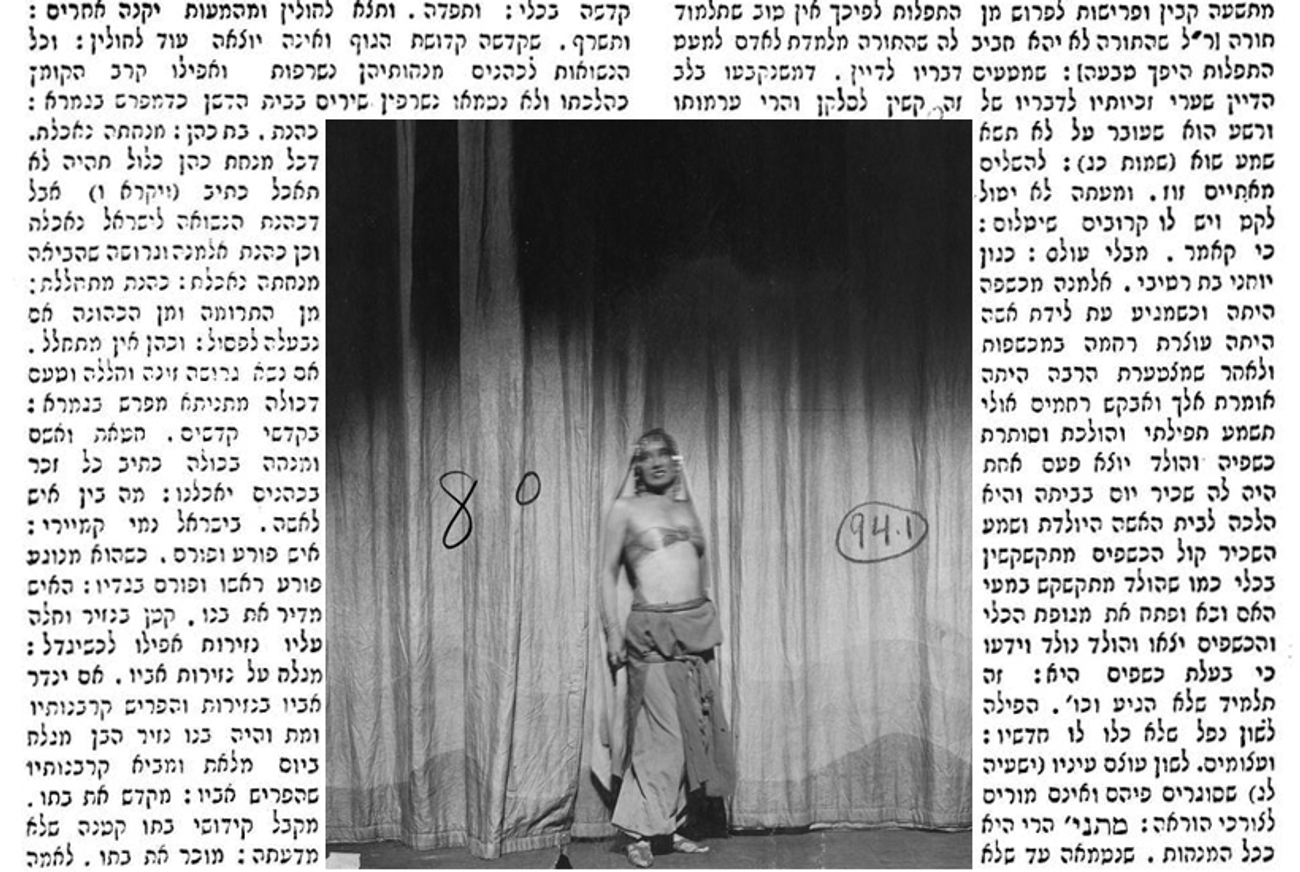Virgins, ‘Partial Virgins,’ Sodomy, Bestiality, Prostitutes, Marriage, and Forbidden Sex
In the patriarchal society of the Talmud, a woman’s body is always under the supervision and scrutiny of men




Literary critic Adam Kirsch is reading a page of Talmud a day, along with Jews around the world.
In last week’s column, I wrote about the surprising frankness with which the rabbis of the Talmud address sexual matters. In America, we are used to regarding religion and sexuality as opposites or enemies, constantly coming into conflict over issues like abortion and homosexuality. This must be, in part, a legacy of America’s Christian heritage, for since Paul, Christianity has placed a high value on chastity and asceticism. Still, while we may regard the Talmud as comparatively sex-positive, the rabbis were not advocating free love. As we saw in this week’s reading from Tractate Yevamot, they drew a tight connection between sex, love, marriage, and procreation. According to Rav Huna, in Yevamot 61b, “Any intercourse that does not increase [i.e., result in children] is nothing other than licentious sexual intercourse.”
Rav Huna’s conclusion is a natural one, considering that the very first commandment God gives humanity in the Bible is “be fruitful and multiply.” The reason a man is obligated to marry his dead brother’s widow—the commandment of levirate marriage, with which this tractate began—is to allow the dead man a symbolic progeny. Sex is a religious act, and in Judaism, every religious act is accompanied by a heavy freight of regulation and qualification. This is especially true when the sexual union in question is that of a high priest and his wife—the subject of the first half of this week’s Daf Yomi reading.
Leviticus 21 puts certain restrictions on whom a high priest may marry: “And he shall take a wife in her virginity. A widow, or one divorced, or a profaned woman, or a harlot, these shall he not take; but a virgin of his own people shall he take to wife.” But as often in the Talmud, the Bible’s rules prove not to be detailed enough to serve as a guide to practice. What, for instance, does “in her virginity” mean? Why doesn’t Leviticus simply say, “he shall take a virgin”? This matter comes up for dispute in the mishna in Yevamot 59a: According to the rabbis, it means “he may not marry a grown woman”; according to Rabbi Elazar and Rabbi Shimon, a grown woman is allowed as long as she is a virgin. At issue is the condition of a woman’s hymen: By the time she is an adult, the rabbis believe, her “hymen has worn away,” so that she can no longer be considered “in her virginity.” By contrast, the dissenting Elazar and Shimon believe that the phrase “in her virginity” is meant to refer not to a perfectly intact hymen, but to a woman with “partial signs of virginity.” The whole discussion is gynecologically clinical and provides perfect evidence of the way that, in a patriarchal society, a woman’s body is always under the supervision and scrutiny of men.
Here too, in the pursuit of legal precision, the rabbis consider a number of violent and aberrant sexual scenarios. A high priest is disqualified from marrying a non-virgin, and he is also disqualified from marrying what the Talmud calls a zona—literally a prostitute, but more generally a woman who has been sexually defiled through forbidden intercourse. But is it necessary, Abaye wonders in Yevamot 59b, to separate these two disqualifications? How could a woman be a zona unless she was also a non-virgin?
One answer comes from Rav Dimi: “There was an incident involving a certain girl in the village of Hitlu who was sweeping the house, and a village dog sodomized her from behind. And Rabbi Yehuda HaNasi permitted her to the priesthood.” Evidently, sex with an animal does not render the girl a zona. In another example, the rabbis wonder whether a woman who has been anally penetrated is considered a virgin for purposes of marrying a priest. The answer is yes, for a surprising reason: Otherwise, “you would have no woman who is fit for the high priesthood, who has not lost her virginity via penetration of a foreign object, by a pebble.” In Talmudic times, pebbles were typically used for wiping, like toilet paper, and so the average woman (or man) would likely be penetrated, after a fashion, by using them; but this did not suffice to take away her virginity.
After all these rather bizarre considerations, it was reassuring to come to the later pages of this week’s reading, which are full of edifying aggadot about the virtues of marriage and parenthood. For a Jew, we read in Yevamot 61b, having children is a requirement for a holy life. Beit Shammai and Beit Hillel disagree about how many children you must have to fulfill this requirement. Beit Shammai say that you cannot stop having children until you produce two sons, after the example of Moses, who separated from his wife Zipporah after fathering Gershom and Eliezer. Beit Hillel, by contrast, look to the Creation story, where God created human beings “male and female” and make this their requirement: Unless you have had both a son and a daughter, you have not fulfilled your reproductive duties.
But if marriage is primarily directed toward childbearing, does that mean that men or women who are incapable of having children, or past the age for it, should not get married? Not at all, the Talmud explains: Companionship is almost as important a value as procreation. “Shmuel said: Even if a man has several children, it is prohibited to remain without a wife, as it is stated [in Genesis]: ‘It is not good that the man should be alone.’ ” If a man does not have children, he is obligated to try to marry a wife who can bear them; but if he is already a father, and he is looking for a second wife, he is free to choose one who is infertile, for the sake of love and affection.
“It is a mitzvah to divorce a bad wife … a bad wife is as troublesome as a day of heavy rain.”
Is having children by itself enough to fulfill the obligation to “be fruitful and multiply”? What if a man has two children, but they die before giving him grandchildren? Then his family line will be wiped out, and perhaps he will have failed to be fruitful. “If one of a man’s children died or was discovered to be a eunuch,” says one baraita, “the father has not fulfilled the mitzvah to be fruitful and multiply.” But the rabbis disagree about the law in this case: Rav Huna says that such a man has fulfilled the mitzvah, while Rabbi Yochanan says he has not fulfilled it. Rav Huna’s position rests on a mystical foundation. The “son of David [that is, the Messiah] will not come until all the souls of the body have been finished,” he believes. In other words, a certain number of preexisting souls must be born before the Messiah can come and consummate the Creation; but once those souls are born and delivered to earth, it doesn’t matter how long they live. Yochanan, on the other hand, believes that what counts is the soul’s actual residence on earth.
Finally, the rabbis turn to a series of proverbs about the value of a good wife and the peril of a bad one. (Of course, the Talmud’s original audience was all male.) “Any man who does not have a wife is without joy, without blessing, without goodness,” said Rabbi Chanilai. “One who loves his wife as he loves himself, and who honors her more than himself, and who instructs his sons and daughters in an upright path, and who marries them off … about him the verse states: ‘And you shall know that your tent is in peace,’ ” goes another rabbinic saying. Exactly what a wife was expected to do for a husband becomes clear in Yevamot 63a, where Elijah the Prophet explains: “When a man brings wheat from the field, does he chew raw wheat? When he brings home flax, does he wear unprocessed flax?” Cooking and sewing are the wife’s expected contributions to the household economy.
By the same token, the rabbis don’t believe there is any virtue in staying in a miserable marriage. “It is a mitzvah to divorce a bad wife,” says Rava, since “a bad wife is as troublesome as a day of heavy rain.” Another sage, Rav, had a notoriously unpleasant wife: “When he would say to her: Prepare me lentils, she would prepare him peas; if he asked her for peas, she would prepare him lentils.” Things went on like this until their son, Chiyya, hit upon a clever strategy: He would convey his father’s dinner requests to his mother but reverse them, so that she would end up cooking the dish he really wanted. Chiyya himself had an unhappy marriage, but he counseled patience: “When he would find something [his wife would like], he would wrap it in his shawl and bring it to her. Rav said to him: Doesn’t she aggravate you? Chiyya said to him: It is enough for us that our wives raise our children and save us from sin.” Such long-suffering was better than the celibacy of Ben Azzai, who counseled others to get married but never did himself: “What shall I do, as my soul yearns for Torah.” But he was an exception: To study the Law meant to follow it, and to follow it meant getting married.
***
To read Tablet’s complete archive oftwo years ofDaf Yomi Talmud study, click here.
Adam Kirsch is a poet and literary critic, whose books include The People and the Books: 18 Classics of Jewish Literature.
Adam Kirsch is a poet and literary critic, whose books include The People and the Books: 18 Classics of Jewish Literature.